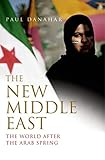The new Middle East : the world after the Arab Spring / Paul Danahar.
Material type: TextPublication details: New York : Bloomsbury Press, 2013.Edition: 1st U.S. edDescription: 467 p. : maps ; 25 cmISBN:
TextPublication details: New York : Bloomsbury Press, 2013.Edition: 1st U.S. edDescription: 467 p. : maps ; 25 cmISBN: - 9781620402535
- 162040253X (trade)
- 956.05/4 23
| Item type | Current library | Call number | Status | Date due | Barcode | |
|---|---|---|---|---|---|---|
| REGULAR | University of Wollongong in Dubai Main Collection | 956.054 DA NE (Browse shelf(Opens below)) | Available | T0049427 |
For the past forty years the images flashing across our television screens from the Middle East have provoked anger, outrage and, sometimes, military action from the international community. But the stories behind them were rarely understood. In 2011 the revolutions of the Arab Spring changed everything. Now, the handful of dictators who ruled brutally over hundreds of millions of people - Hosni Mubarak, Ben Ali, Saddam Hussein, Muammar Gaddafi and Bashar al-Assad - have gone, or are fighting for their lives. They have left behind countries in turmoil, the people forced to re-examine their identities and regional loyalties, and to decide what role Islam will play in their lives and their politics. The collapse of the old order has left the West scrambling to make sense of a region it hardly recognises. If the people of the Arab world can now speak openly for the first time, then it is also the West's first chance to listen. And there are many questions to be answered. Drawing on compelling first-hand reporting from Egypt, Iraq, Libya, Israel, Syria and Tunisia, and deep knowledge of the region's history and access to many of its key players, BBC Bureau Chief Paul Danahar lays bare the forces that are shaping the new Middle East.
Includes bibliographical references (p. 429-452) and index.
The collapse of the Old Middle East -- Egypt's long war. I: The battle begins ; II: Revolution -- The problem -- Israel : it's complicated -- America's pillars of sand -- Iraq : SNAFU -- Libya : Year Zero -- Syria : The Arab world's broken heart.
There are no comments on this title.
